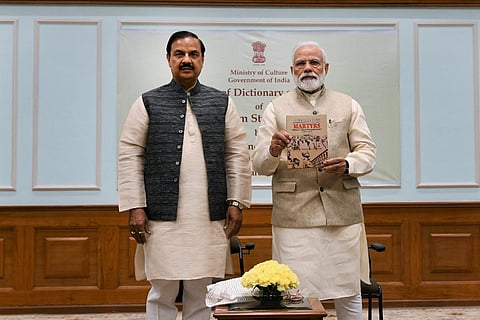

In July this year, the annoucement that Malayalam director Aashiq Abu was going to make a film on Variyamkunnath Kunjahammed Haji, a leader of the Malabar Rebellion, led to much outrage from the right wing. The filmmaker and his team were accused of glorifying Variyamkunnath as a freedom fighter while according to the BJP, the Malabar Rebellion was anti-Hindu and led to the massacre of Hindus by Muslims. They alleged that Variyamkunnath was a bigot.
However in an embarassment for the party, it has come to light that Variyamkunnath's name has found a place in the list of martyrs of the freedom struggle in the book Dictionary of Martyrs of India's Freedom Struggle, jointly published by the Ministry of Culture, Government of India and Indian Council of Historical Research (ICHR). The book was released by Prime Minister Narendra Modi in March 2019.
The announcement of the film had triggered a loud debate on the Malabar Rebellion and the role of Variyamkunnath, one of the main leaders of the Rebellion who was executed by the British. Sangh Parivar organisations came out against the movie strongly, claiming that Variyamkunnath was responsible for the atrocities against the Hindus and that he must not be portrayed as a hero.
State leaders of the BJP and Hindu Aikya Vedi leader KP Sasikala alleged that the film's team had an agenda to "whitewash" history. However, the inclusion of Variyamkunnath as a martyr in a book published by the government of India is likely to put the Sangh Parivar organisations on the defensive.
According to the description given in page 248 of the book, Variyamkunnath was born in Nellikottu in Eranad, South Malabar, Kerala, as the son of Moideen Haji and Aminakutty Hajjumma.
"A close associate and relative of Ali Musaliar, an important rebel Mappila leader, he and his father were exiled to Mecca for a short period for anti-government activities. Thereafter they came back, but continued with their anti-British demeanour. He became a significant Khilafat leader in Majeri and Nilambur, and led an attack on the British army at Kallamala, as well as on the Gudalur Police Training Camp. He also proclaimed himself a ruler in the area, paralyzing the British administration there for a short period. But Haji was captured from Kallamoola in January 1922, and after a summary trial at Martial Law Court, shot dead on 20 January 1922," the book says.
Arvind P Jamkhedkar, Chairman of ICHR, was the general editor of the dictionary and Rajaneesh Kumar Shukla, member secretary of ICHR, was the executive editor. Ashfaque Ali, Noushad Ali, Shakeeb Athar and Muhammed Niyaz A are the members of research and editorial team of the book. The general editor’s note in the book says that the objective in the project is to “search for the cases from all segments of Indian society, and to bring into focus not only the known, but also the barely known, the obscure and the forgotten (especially for the lower rungs of society), and enlist martyrs into the liberated India's roll of honour."
The note also says that in order to write about the martyrs (backgrounds, occupations, affiliations and circumstances to deaths), and authenticate their martyrdom from the primary sources, apart from the scattered secondary materials, the central research team of the project had to undertake arduous trips to different archives and repositories in the states.
When contacted, BJP spokesperson Sandeep Varrier, who had strongly opposed the movie on Variyamkunnath, said that he cannot comment on the book as he hasn't gone through it yet.